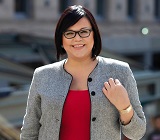The face of law is changing. According to the Law Society of Ontario, about 43 per cent of lawyers are women. And the final report released in 2016 from the Law Society’s Challenges Faced by Racialized Licensees Working Group noted that the proportion of racialized lawyers in Ontario doubled between 2001 and 2014, from 9 per cent to 18 per cent. In an effort to highlight the diverse range of individuals working across the legal landscape, we are pleased to present our new series, This is What a Lawyer Looks Like. The goal of this series is to put racialized and Indigenous women lawyers in the spotlight and amplify their voices in the conversation about gender equality.
Do you know someone we can feature? Send a note to the editor.
 NAOMI SAYERS
NAOMI SAYERS
Barrister & Solicitor
Tell us about yourself.
I have a broad public law practice. I generally say to others, “if the government has made a decision that has affected you personally, you come see me!” I am licensed to practice law in both Ontario and Alberta (Alberta has a special place in my heart, having lived and worked in Northern Alberta). I am a member of the Algoma District Law Association, the Manitoulin Law Association (Manitoulin Island), the CBA/OBA and the Criminal Lawyers’ Association. I have close connections to Algoma and Manitoulin with family from and living in both districts.
Why did you choose to become a lawyer?
I applied to law school because I wanted a back-up plan, but I really wanted to go to graduate school to study criminology. Unfortunately, I did not get into graduate school, but I was accepted into law school (all of the ones I applied to!). The only reason I applied to become a lawyer was because it seemed like the next best step. There is no particular fancy or heart-warming story. I think it is relevant, through a feminist lens, that not all stories are the same. My application to law school did disclose exploitation and gender-based violence. Today as a lawyer, I try to avoid the replication and repetition of my own story of trauma or romanticizing it at the expense of myself.
What is your favourite part about being a lawyer?
I enjoy helping people figure things out, whether that means they need to even hire a lawyer or whether they should hire a lawyer at a very basic level. Some of the inquiries I receive just need to be redirected. Sometimes, others just need to be given a frank answer about what they need to do to avoid having to hire a lawyer. Lawyers, for some people, are scary. I think it is important to recognize this fact.
What is something interesting you are working on now?
I am working with some non-profit organizations on developing better responses to public consultations and using the law to help achieve desired results, including by centering the stories of young people.
How do your background and experiences influence your practice?
As a trauma survivor, my experience and introduction to the justice system was not always positive. As a result, I have had not-so-great experiences with some lawyers – particularly with lawyers who adopt a saviour-like practice or expect to try to connect with me on a personal level; if I hired you as my lawyer, you are my lawyer, not my friend (we can, maybe, be friends later).
Sadly, it is sometimes lawyers who identify as (mainstream/whitestream) feminists who also perpetuate and replicate white supremacist structures and play a role in isolating and alienating Indigenous and racialized folks from the legal profession. I want to avoid doing all of this but sometimes I do participate in it unintentionally and this is a constant work in progress for me.
What is one challenge you recently dealt with?
I moved and started my own law practice. There is also a lot of trauma I am returning to and it is something that is very triggering for me. Like my practice, it is a work in progress. I am also thinking about moving to Alberta. I really love new challenges and I also really love Alberta!
What is one piece of advice you would give to young women planning to pursue a career in law?
Just like anything new in life, it will be different, and it may be difficult or challenging. It was challenging for me because I experienced a lot of racism, alienation and isolation during law school as someone doing a lot of public advocacy around sex work decriminalization.
During this time, I wrote a blog post about the Cindy Gladue case which went (I hate to say this word) viral and the case triggered national protests and eventually an appeal that was heard at Canada’s highest court. I had no one to turn to on campus to talk about the effects this case had on me, as an Indigenous woman with experiences in the sex trade across Canada and in the United States.
The senior feminist lawyers who were then talking publicly about the case only ever supported the abolition of sex work or supported Indigenous woman when they are victims, obedient or subservient. It told me, an Indigenous woman with experience in the sex trade, that Indigenous women in the sex trade only matter when we are dead. I expect better from legal professionals, and any young woman should continue to expect and demand better.
It will be hard and lonely but if you trust that you are doing the right thing (so long as it is informed), then just continue to do the work; it does not matter what other people say about you or about your work, there will always be criticism and critics.
Please log in to read the full article.